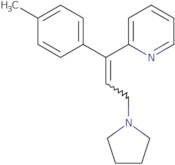
Informations sur le produit
- 2-[(1E)-1-(4-Methylphenyl)-3-(1-pyrrolidinyl)-1-propen-1-yl]pyridine
- Pyridine, 2-[(1E)-1-(4-methylphenyl)-3-(1-pyrrolidinyl)-1-propen-1-yl]-
- Pyridine, 2-[1-(4-methylphenyl)-3-(1-pyrrolidinyl)-1-propenyl]-, (E)-
- Pyridine, 2-[3-(1-pyrrolidinyl)-1-p-tolylpropenyl]-, (E)-
- Trans-1-(4'-methylphenyl)-1-(2''-pyridyl)-3-pyrrolidino-1-propene
- Tripolidina
- Triprolidin
- Triprolidine
- Tripyrolidine
- trans-1-(2-Pyridyl)-3-pyrrolidino-1-p-tolylprop-1-ene
- Voir d'autres synonymes
- trans-1-(4-Methylphenyl)-1-(2-pyridyl)-3-pyrrolidinoprop-1-ene
- trans-2-[3-(1-Pyrrolidinyl)-1-p-tolypropenyl]pyridine
Actidil is a drug that inhibits histamine release from mast cells and basophils, which are cells responsible for allergic reactions. Actidil prevents the release of inflammatory mediators, such as histamine, leukotrienes, and prostaglandins. Actidil has been shown to inhibit polymerase chain reaction (PCR) in experimental models. This drug is used mainly to treat bowel diseases, such as ulcerative colitis and Crohn’s disease. It can also be used for the treatment of liver lesions caused by cytostatic drugs. Actidil has been tested in humans with other diseases as well, including asthma and rhinitis. The most common side effects are headache, dizziness, drowsiness, dry mouth or throat, constipation or diarrhea, nausea or vomiting.
Propriétés chimiques
Question d’ordre technique sur : 3D-AAA48612 Actidil
Si vous souhaitez demander un devis ou passer commande, veuillez plutôt ajouter les produits souhaités à votre panier, puis demander un devis ou passer commande à partir de votre panier. C'est une méthode plus rapide, plus économique, et vous pourrez bénéficier des remises disponibles ainsi que d'autres avantages





